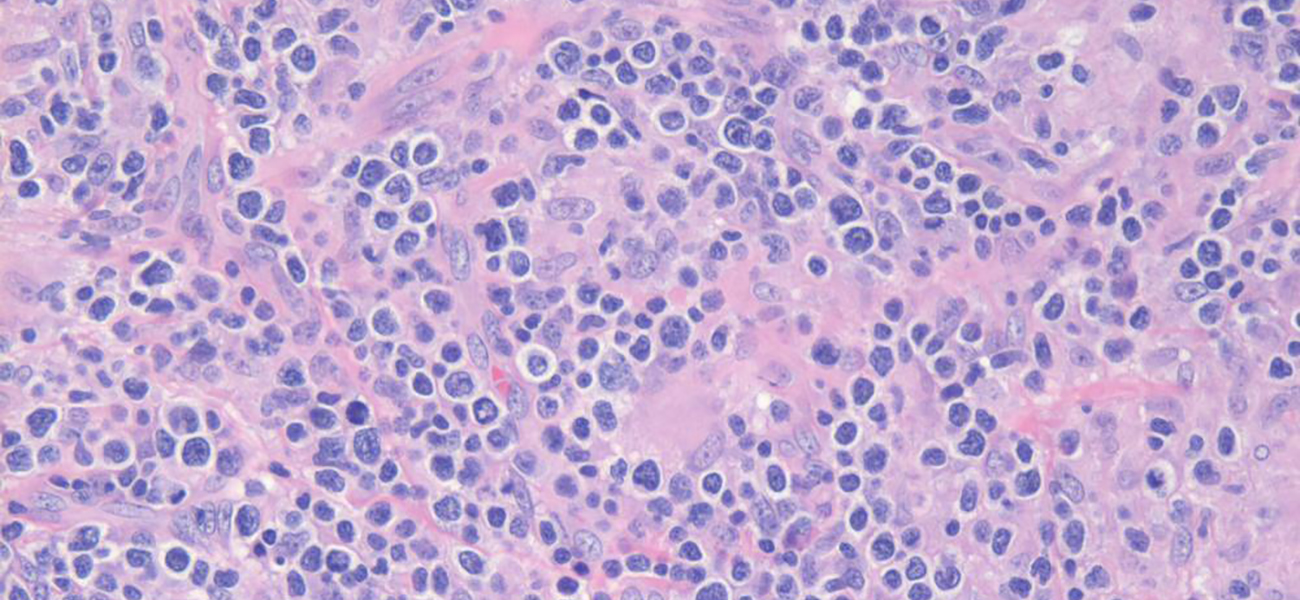T-cell lymphomas comprise approximately 10-15% of all Non-Hodgkin’s Lymphomas (NHLs). The main subsets are peripheral T-cell lymphoma (PTCL) and cutaneous T-cell lymphoma (CTCL). PTCLs refers to the nodal or systemic T-cell lymphomas and comprises 19 different entities with varying clinical and pathologic presentation including PTCL-not otherwise specified (NOS), angioimmunoblastic T-cell lymphoma (AITL), anaplastic large cell lymphoma (ALCL) and adult T-cell Leukemia/lymphoma (ATLL), a rare and aggressive T-cell lymphoma linked to human T-cell lymphotropic virus type 1 (HTLV-1). CTCL originates in the skin, including the main subtypes mycosisfungoides (MF) and Sézary syndrome (SS). The various subtypes have distinct pathophysiology and molecular profiles. Beyond this, there is geographic diversity. For example PTCLs are rare in the United States and are more common in Asia, Africa and the Caribbean.
Newly diagnosed PTCL patients are usually treated with anthracycline-based chemotherapy regimens. On November 16, 2018, the Food and Drug Administration (FDA) approved brentuximab vedotin in combination with chemotherapy for previously untreated systemic anaplastic large cell lymphoma (sALCL) or other CD30-expressing peripheral T-cell lymphomas (PTCL), including angioimmunoblastic T-cell lymphoma and PTCL not otherwise specified. This is the first FDA approval for previously untreated PTCL including sALCL. Brentuximab vedotin has demonstrated clinical benefits for patients with CD30+ malignancies. Agents have been approved by the FDA for use in the relapsed and refractory PTCL setting, belinostat, romidepsin, pralatrexate, have overall relapse rate (ORR) ranges from 23-33%.
Therapeutic options for CTCL are mainly palliative focusing on relief of symptoms. Whereas early stage patients are well served, in the case of persistent or recurrent disease, therapeutic options remain unacceptable with FDA approved HDAC inhibitors, vorinostat and romidepsin. On Aug. 8, 2018, the Food and Drug Administration approved mogamulizumab-kpkc (Poteligeo, Kyowa Kirin, Inc.) for adult patients with relapsed or refractory mycosis fungoides (MF) or Sézary syndrome (SS) after at least one prior systemic therapy.
Are you a Patient or Caregiver? Click here for our free informational booklet on PTCL or CTCL.
Though T cell variants account for a small fraction of NHLs they often carry a significantly worse prognosis with fewer treatment options relative to their B-cell counterparts. LLS Research has long considered malignancies of T cell origins are indications with extremely high unmet need.
Recently David Weinstock M.D., Professor at Harvard Medical School and Attending Physician at Dana-Farber Cancer Institute received a prestigious $5 million Specialized Center of Research (SCOR) grant, LLS’s most ambitious funding program. This major project enabled him and his colleagues from Memorial Sloan Kettering Cancer Center, Weill Cornell Medical Center and Brigham and Women’s Hospital to test different targeted approaches for treating patients with T-cell lymphomas.
Stephen Ansell M.D., Ph.D. at Mayo Clinic is studying how well immune checkpoint PD-1 blockade works in PTCL, the specific mechanism of action of PD-1 blockade in PTCL, and in which subgroup of PTCL patients PD-1 blockade is predicted to have clinical benefit.
Another researcher at Mayo Clinic, the research of Andrew Feldman, M.D is aiming at improving outcomes for patients with ALK-negative anaplastic large cell lymphoma (ALCL). He will (1) identify molecular mechanisms underlying clinical aggressiveness of ALCL; (2) test novel therapeutic combinations in immunocompetent preclinical models; and (3) develop a multianalyte biomarker panel to guide personalized therapy.
The image was originally published in ASH Image Bank. Girish Venkataraman, MD, MBBS. Lymphoepitheliod cell ("Lennert's") lymphoma. ASH Image Bank. 2020;60534. © the American Society of Hematology.

